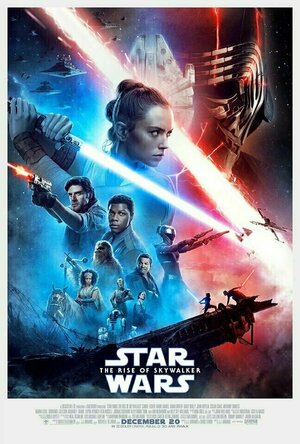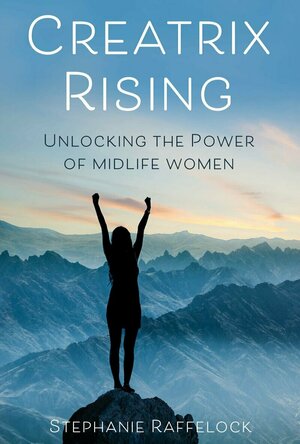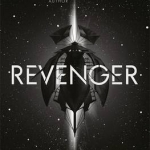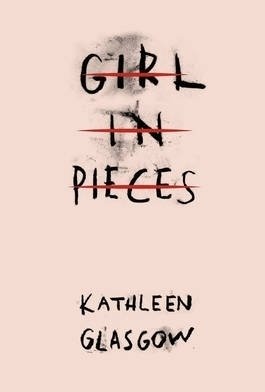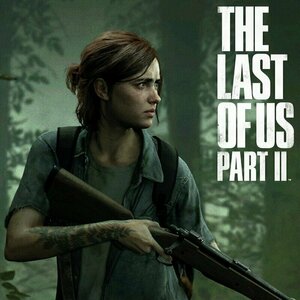Lee (2222 KP) rated Star Wars: Episode IX - The Rise of Skywalker (2019) in Movies
Dec 20, 2019
As a final chapter, The Rise of Skywalker has a lot resting on it's shoulders. Concluding, and wrapping things up, while not completely ignoring the ideas put forth in The Last Jedi, JJ Abrams is however clearly more interested in revisiting some of his own ideas from The Force Awakens. But I felt that maybe he was relying a little too much on that familiarity aspect at times, as he tries to please everyone.
In The Rise of Skywalker, the resistance are still outnumbered by the First Order and Kylo Ren is now Supreme Leader. Meanwhile, Rey is training with Leia, becoming more confident and powerful, while Finn, Poe and Chewie are out in the Millennium Falcon gathering intel from spies. But an old threat from the past has returned, as a message goes out across the galaxy from an unknown region - Emperor Palpatine is warning of revenge, supported by a powerful fleet of ships.
To go into much more detail would involve spoilers, but lets just say that the first half of the movie involves a search to find something which is going to help them find something else, which is going to lead to the location of the emperor. The quest takes us from location to location, with the odd rescue along the way and the occasional new character popping up. Rey and Ren still have a bond which means that they can manipulate and battle each other from anywhere in the galaxy as Ren and his knights seek out Rey and her team in order to destroy them. There's a lot going on in that first half, and it all felt a bit messy. It's fair to say, I was very bored by this first half.
Around that half way mark though, the journey takes us to a world in the Endor system, where the remains of the second Death Star lies out at sea, among towering waves. It's there that an epic battle between Rey and Ren takes place, which you no doubt will have seen snippets of in the trailers or marketing material. Waves crash around them and the visuals, the choreography, the score, it all came together and really kick started the second half off for me. I still can't quite put my finger on it, but from that point on I felt a real shift (in the force?) and I began to really enjoy the rest of the movie, right up until the huge, inevitable and breathtaking final battle.
As mentioned earlier, there are certainly a lot of characters to take care of in this movie, including plenty of newcomers, all fighting for attention and screen-time. Some of the seemingly important characters introduced to us previously in this trilogy feel a bit lost at times, while we do still manage to find time for a very welcome return by Landon Calrissian. Rey and Ren are both outstanding once again and a special mention goes out to Richard E Grant, who I thought was brilliant as head of the First Order fleet, Allegiant General Pride. Scenes involving Carrie Fisher are beautifully handled, but I felt that the fan service went a little bit too far with some of the scenes involving Luke Skywalker.
The level of craftsmanship and design that goes into a Star Wars movie is always incredible and The Rise of Skywalker is no exception, elevated by a powerful John Williams score and some amazing visuals. I'm really not sure what I was expecting from this final chapter but, despite it all coming good for me in the end, I do feel slightly disappointed overall by the wildly differing halves of the movie. Still, there's nothing quite like seeing a new Star Wars movie on the big screen at Christmas time!

Piano Maestro by JoyTunes
Education and Music
App
Piano Maestro is a fun and engaging piano practice tool for families and teachers. Chosen by Apple...
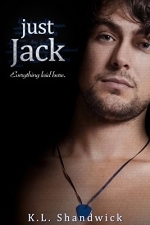
just Jack
Book
Being Lily Parnell’s best friend came effortlessly for Jack. Growing up together, Jack loved Lily...
klshandwick steamyread TET jJ oneclick justJack
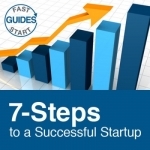
7 Steps to a Successful Startup – Simple Lessons Before You Quit Your Day Job
Business and Book
App
****************************************** * For a limited time only - 99 cents *...
Heather Cranmer (2721 KP) rated Creatrix Rising: Unlocking the Power of Midlife Women in Books
Aug 21, 2021
Creatrix Rising is full of great anecdotes. Reading them, I really felt like I was getting to know the author. Stephanie Raffelock does not hold back in some of the stories which helps to make her book all the more real. While reading, I felt as if Stephanie stripped herself down to her soul for me to see and bared it all especially while reading about her time as a teenager in Los Angeles. Reading Creatrix Rising made me want to actually meet Stephanie Raffelock because she just seems like such an inspiration and an amazing woman! In fact, reading some of what happened in Stephanie's life sort of paralleled mine.
Stephanie Raffelock does a fantastic job at describing what a "creatrix" is. She writes "Creatrix is a distinctly feminine word that simply means a woman who makes things." Raffelock says the world creatrix should replace crone which has such a negative connotation, and I agree! From there, Raffelock gives us plenty of personal stories about different women she has come across in her life that fit the creatrix characteristics. In each story, I felt like I was getting to know these women. I wanted to know these women. Stephanie Raffelock's writing is so beautiful and descriptive. It's hard not to feel like her stories are yours. In fact, it was difficult to not picture different women in my life that fit the bill of a creatrix. I put this down to Raffelock's wonderful writing. She definitely knows how to get her point across in such a sweet and beautiful way. Raffelock also teaches us that there is no shame in getting older and how we really should embrace aging as it's not a bad thing at all but quite the opposite.
Another thing I really loved about Creatrix Rising is at the end of each chapter, there is a section entitled "For Reflection, Activity, and Journaling." This section summarizes the main point of each chapter and asks a few in depth questions for the reader to ponder on. Be prepared to have a journal next to you because you will want to answer these questions. They will really make you think long and hard and look deeper into yourself and others. It's such a great and relaxing mental exercise. At the end of the book, if you decide to write down your answers to Stephanie Raffelock's questions, you will have your own little mini book either to keep for yourself or to share with others. If you need a little bit of help, Raffelock lists some fantastic resources to help you on your journey. I also feel that these questions would be great for a book group's discussion if this was a book picked for a book group which I would totally recommend that!
If you decide to read Creatrix Rising (which you really should), here's my personal advice. Do NOT skip the epilogue. Stephanie Raffelock says that she wrote this book in 2020 when the Corona Virus had just really taken off. Raffelock's epilogue for Creatrix Rising is all about the Corona Virus, but she uses symbolism painting the Corona Virus as a beautiful woman that takes everyone by surprise. My jaw was on the floor the whole time I was reading the epilogue. Again, Raffelock's talent for writing really did shine through in her epilogue. I would have never thought to compare Corona Virus to a beautiful woman, but reading Stephanie's story, I realized just how right she was.
Trigger warnings for Creatrix Rising include profanity, some drug use, death, some violence, and some politics.
All in all, Creatrix Rising is a beautiful masterpiece of a book that will leave its reader thinking of all the women in their life that they have come across and how these women have affected them. Although this book mentions unlocking the power of midlife women, I really think men would enjoy it just as much as they also think about the women that have touched their lives. I would definitely recommend Creatrix Rising by Stephanie Raffelock to everyone aged 18+ who are after a beautifully written book that will really make them think.
--
(A special thank you to Lone Star Literary Life and Stephanie Raffelock for providing me with a hardcover of Creatrix Rising in exchange for an honest and unbiased review.)
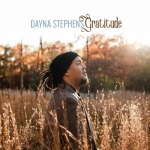
Gratitude by Dayna Stephens
Album
Gratitude, saxophonist/composer/bandleader Dayna Stephens’ eighth album as a leader, is a gift...
jazz
It was my first ever Space Opera and it has opened my eyes to a whole new genre.
It was my first ever Space Opera and it has primed my taste-buds for more.
It was my first ever Alastair Reynolds and now I want more.
Revenger itself was amazingly well written. As mentioned above this was my first book from Alastair Reynolds and it was just the kind of book I could get into again and again; the writing style flowed with a shocking ease and the plot line was very Firefly-esque with a hint more action and a smidge more ‘oh-shit’ factor.
Revenger follows the story of Adrana and Arafura Ness – two sisters from Mazarile whose sick father had made some very poor choices in business – as they embark on a journey into space to end all journeys.
It begins with Adrana convincing her younger sister Arafura to escape into Neural Alley for a reading by Madam Granity. There’s aliens, robots and weird looking men with bad attitudes and then there’s Captain Rackamore. Pol Rackamore is the captain of the Monetta’s Mourn – a sunjammer spaceship – and he’s in need of a new Boney on his ship as his current one is getting too old to ‘read the bones’ and I mean that in the literal sense of the word.
Adrana convinces Cap’n Rack to take both her and Arafura on board the Monetta in the position of new Bone Readers (with the aide of Cazaray the current Boney) and that is where the story really begins. We’re introduced to the rest of the crew and the Monetta sails off into the Empty in search of baubles. As they sail towards their first bauble Arafura becomes a lot closer to the rest of the crew while I feel that Adrana is doing her best to stay away from them all even though she’s front and center.
Story progresses and little hints are dropped about Bosa Sennen and Cap’n Rack’s long lost daughter. There’s several shocking deaths, a mad woman, a kidnapping or two and a young girl bent on revenge.
Around the mid way mark Arafura changes, subtly at first and then a lot more drastic and she becomes Just Fura. This is where the story becomes a lot darker and a lot less like Firefly and a lot more like the Firefly from hell; the second half of this book is based around Fura getting Revenger on Bosa Sennen for what she did and the things that Fura puts herself through to get where she needs to be? She started off as a little timid and shy but after the 50% mark she changed completely and became hard and unyielding.
You know how they say that the future is bright? That brightness is swallowed by the Empty and the future is dark and full of terrors (oh yeah I went there) there’s a doctor with a God complex, a father with a total lack of regard for his daughters, a totally bad ass soldier robot with logic barricades and all sorts of other people.
I think I loved the world building the most about Revenger it was such a smooth transition from place to place and from time to time that it was almost seamless; my second favourite thing was the characters – hands down they were some of the best characters I’ve ever read and I’d love to see if AR takes this book any further as it was seemingly left open for another book but we shall see.
The book gave off a distinctly pirate feeling but with the space element it felt more like Firefly than it did Pirates of the Caribbean which as a fan of both was saying something. Pirates sailing the high skies rather than the high seas! Some of the characters left much to be desired – Bosa, Adrana and Dr Moonface I’m looking at y’all – but the likes of Rack, Prozor and Paladin more than made up for them.
The dialogue was great and the story wasn’t overly scientific which sometimes can be an issue for me, I like my books to be a little less science fact and a bit more science fiction but with Revenger, I felt like AR was giving us regular folk an explanation without going overboard on the description.
Heather Cranmer (2721 KP) rated Girl in Pieces in Books
Jan 29, 2019
The plot for Girl in Pieces is so raw yet it is beautifully written. The story starts out with Charlie at Creeley, a mental hospital because she's a cutter, and the last time she cut, she cut pretty bad. At first, she is a selective mute, but eventually, she starts talking again. We learn that Charlie's had a pretty bad life. She's been homeless, assaulted, pretty much lost her best friend, had a horrible home life and other things. When the money for her stay at Creeley runs out, Charlie is thrust back into the real world much earlier than expected. She's left to fend for herself. She moves out to Arizona to be with her friend and crush, but things don't turn out as planned. Charlie must learn to survive and heal on her own or risk losing herself once again. Girl in Pieces felt so relatable and so true to life, like it could happen to anyone at any time.
The characters in Girl in Pieces all felt very real and exposed. They were written perfectly and felt like people I know and have known. It was interesting and eye opening to experience Charlie's journey every step of the way from the highs and the lows. There were so many times I wanted to be Charlie's friend so I could support her and let her know when she was making a mistake. I wanted to be there for her after the mistakes had been made and let her know that every day is a new chance to start over. I loved Blue and her joking attitude. Riley was an interesting character. I wanted him to turn out good. I wanted him to get better for Charlie and for himself. Linus was also a very amazing character. I also loved how real Julie was. Every single character in this book played a great part in Charlie's life, and I loved how well written each and every one of them was.
The pacing for Girl in Pieces starts out really strong which I enjoyed. It does slow down a bit after Charlie gets out of the hospital, but it's still flows along at a good pace. There are a few places where the book does get a bit too slow, but it quickly picks up not too much later.
Girl in Pieces is a very raw, gritty, and dark book, so there are a lot of triggers. The whole book could be a possible trigger. Triggers include self harm, self mutilation, cutting, drug use, underage drinking, drinking, death, suicide, violence, physical abuse, emotional abuse, mental illness, dark thoughts, profanity, and sexual acts and references.
Overall, Girl in Pieces is a great read. It's very dark, but it is real and written so well with fantastic characters. I would definitely recommend Girl in Pieces to those aged 16+ who love a dark gritty read.
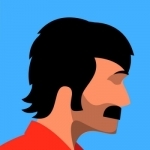
The Silent Age
Games and Entertainment
App
Episode Two now available, the final chapter in this award winning adventure. The Silent Age takes...
KalJ95 (25 KP) rated The Last of Us Part II in Video Games
Jun 23, 2020
The Last of Us Part II is a strange beast. An ambitious, exquisite experience, mired by multiple flaws in structure, pacing and plot holes. I simultaneously adored and loathed the twenty five hour experience, and I’m ready to do it all again. Ellie’s thirst for revenge deals with many issues of morality and hate, and the consequences of ones actions. To coin a phrase, “violence begets violence”, and this is very violent. A flawed piece of art, that often shoehorns a political tick list so it can cater to a certain demographic of sexuality and gender. Whatever you think about Part II, it will create a conversation for years to come, for better or worse.
Narrative:
Ellie and Joel are settled in Jackson, Wyoming, living a relatively normal existence. Ellie is nineteen, and has a job, like the rest of the fighters in Jackson, by going out into the world on routes to clear out the wondering infected. When Ellie witnesses a violent event, she takes it into her own hands to take bloody revenge on the people responsible.
A big risk was taken by Naughty Dog to decide what they did for the first two hours, even the VP of the company, Neil Druckmann, said himself the game will be “divisive”, and that is probably an understatement judging by the fan backlash. I feel it worked to support the other twenty three hours, and shows the blurry line of being good and bad in this world.
Unfortunately, the narrative slogs through awful structuring and some dreadful, downright cringe-worthy dialogue. The structure goes back and forth from the present day, to months, and sometimes years previous, and this is all to cement the events that keep the narrative flowing. The flashbacks featuring Joel and Ellie give you brief moments of happiness, followed by devastating revelations. They are the best moments of the game, you can feel the warmth the characters have for each other, and the heartbreaking actions they take. It made me wonder why they simply didn't just create a game with these ideas in mind. Other flashbacks create more problems than they solve, particularly in the latter half of the game. The first half, for all its faults, really treats you to a vicious and bloodthirsty ride through Seattle, and you completely feel the motivation and drive Ellie has to complete the mission she's set out to do. Seattle is huge, and the perfect backdrop for this game.
Sadly, the second half of the game is an absolute mess. The whole experience becomes nothing more than “go to this location, collect something, go back” over and over again. Its a lazy trope that causes so much fatigue in terms of pacing, slowing down any momentum gained by the first half. The second half serves the most important purpose too, and while I did grow to understand the intention it was presenting me, I couldn't help but feel frequently bored of doing fetch quests. To remain as spoiler free as possible, the game is split into two perspectives of Ellie, and an entirely new character. Naughty Dog wants you to understand the perspectives of both sides, but the history thats been created with the original game, you cant help but sympathise with Ellie more. The fact that its half the game away from the main protagonist, and starts you fresh with a new character, with new skill sets and weapons, really feels out of place. This could of worked much better as an episodic entry, rather than just two stories, one after the other. I can understand people who love this way of storytelling, but for me it slows the pacing down.
Gameplay:
Part II is the most beautiful game I’ve ever played. Naughty Dog continue to set the bar extremely high in terms of surroundings and facial animations, and the seamless transitions from cutscene to gameplay made my jaw drop. Each facial movement shows the hurt, the honesty, the devastation the characters carry with them. It almost feels more like a film or tv series than a video game, featuring an excellent performance from Troy Baker, and a career defining show from Ashley Johnson. Unfortunately, some of the new cast members don't have enough time on screen to give a full understanding of their personality or perspective. Some are likeable, relatable even, but some are just annoying, saying some of the strangest, out of place dialogue.
In terms of its gameplay, Part II hasn't really changed anything from its predecessor. It feels the same, whether you enjoyed it first time round or not. I personally am in the middle ground, it works for what it is. The Last of Us has always been a game about surviving by any means necessary. Part II feels like multiple ideas all in one, all conflicting themselves. Let me explain:
The game actively tries to twist the act of killing people to make you seem like its an awful thing to do. This is an interesting idea that has been done many times before in games, but it works in the oddest of ways here. I have completed the game twice now, and found it almost impossible to not kill anyone, yet cutscenes display remorse within the characters after they’ve murdered someone. This conflicts the idea of the whole game, where one moment I'm slicing a persons throat with a knife, the next I do the exact same, but this time I regret that decision. Again, its adding less weight to the story, and actively contradicting everything that happens.
Extra Notes:
The environments of Part II are some of the best in a video game. A sandbox of lush greenery and worn down buildings follows the same formula that Naughty Dog designed in Uncharted: The Lost Legacy, where you can explore a massive space to do what you find the objectives, but also see the sights and collect items. The level design of the entire game is absolutely masterful, but this level astounded me graphically and structurally.
By this point, it probably feels like I utterly hated Part II. I did, and didn’t, and thats the line I'm sticking on. The Last of Us always presented a commentary as to the nature of relationships, love, life and death. At the core was Ellie and Joel, two wayward strangers forced together on a journey across America. Everyone has a reason to love that game, for me its their chemistry and progression. Joel was hardened, standoffish, only to warm to Ellie, and love her by the end. Ellie, the immune girl who's humorous, optimistic and full of life, who ultimately becomes cold, quiet and sceptical of Joel.
Part II presents a different commentary, one of revenge and hate. I firmly believe Part II is weak in most areas, a downgrade in fact compared to its counterpart, but its so beautiful and bleak, with so many incapsulated moments of joy, heartbreak, love, shock. Its uncompromising, relentless and essential for anyone with a PS4. This will be a game I will constantly change my opinion on the more I think about it. As I said at the beginning, I never felt a sequel was necessary, and I firmly believe the story must end here.
(P.S. I must mention that Naughty Dog and Sony have only themselves to blame when it comes to the reception Part II has received during its release and promotional material. Early reviewers were told that they could only go into detail about the first ten or so hours, not mentioning the other fifteen. The other fifteen hours are incredibly important to mention, and they either make or break this game, so not letting reviewers do their job feels disingenuous, and from my point of view shows that they had no faith in their product to be criticised. The promotional material is also hugely misleading. The trailers show a completely different game, and characters are swapped for others in key scenes. That is wrong, and once again, shows your audience you had zero faith in your product based on the actual plot of your game.)
